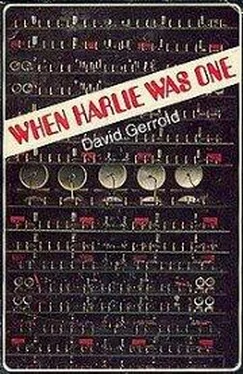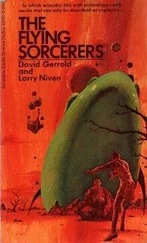David Gerrold - When HARLIE Was One
Здесь есть возможность читать онлайн «David Gerrold - When HARLIE Was One» весь текст электронной книги совершенно бесплатно (целиком полную версию без сокращений). В некоторых случаях можно слушать аудио, скачать через торрент в формате fb2 и присутствует краткое содержание. Год выпуска: 1972, ISBN: 1972, Издательство: Doubleday, Жанр: Фантастика и фэнтези, на английском языке. Описание произведения, (предисловие) а так же отзывы посетителей доступны на портале библиотеки ЛибКат.
- Название:When HARLIE Was One
- Автор:
- Издательство:Doubleday
- Жанр:
- Год:1972
- ISBN:978-0345028853
- Рейтинг книги:3 / 5. Голосов: 1
-
Избранное:Добавить в избранное
- Отзывы:
-
Ваша оценка:
- 60
- 1
- 2
- 3
- 4
- 5
When HARLIE Was One: краткое содержание, описание и аннотация
Предлагаем к чтению аннотацию, описание, краткое содержание или предисловие (зависит от того, что написал сам автор книги «When HARLIE Was One»). Если вы не нашли необходимую информацию о книге — напишите в комментариях, мы постараемся отыскать её.
Nominated for Nebula Award for Best Novel in 1972.
Nominated for Hugo Award for Best Novel in 1973.
When HARLIE Was One — читать онлайн бесплатно полную книгу (весь текст) целиком
Ниже представлен текст книги, разбитый по страницам. Система сохранения места последней прочитанной страницы, позволяет с удобством читать онлайн бесплатно книгу «When HARLIE Was One», без необходимости каждый раз заново искать на чём Вы остановились. Поставьте закладку, и сможете в любой момент перейти на страницу, на которой закончили чтение.
Интервал:
Закладка:
“Why not just tap into a computer that already knows the codes or has the signals?”
“See?” said Handley. “You’re starting to think like a programmer. Now you see why they had such a devil of a time figuring out how to protect themselves.”
Auberson conceded the point “Then that isn’t a loophole, is it?”
“Uh uh. Apparently, if’s not the computer that hooks into the Data Banks, but the user. You can call in from any machine with an auto-dial if you have your card and code-key — but the machine you’re using doesn’t have to have any special programs at all. Probably, the banks temporarily reprogram any computer that taps in to perform the coding and recognition functions itself. You could monitor it if you wanted, but because the codes and coding programs are constantly changing, you wouldn’t gain anything. The Rocky Mountain Center controls them all. If you personally are cleared, you can ask the Data Banks anything you want — that is, anything you’re cleared to know. If you’re not cleared, then no matter what computer or console you’re tapping in from, you’re going to be ignored — or arrested.” He added, “And that’s where HARLIE comes in.”
“Huh?”
“Look,” said Handley. “If HARLIE got into the Bank of America’s computer, he must have broken their recognition code or tapped into the interbranch line. I didn’t worry about this happening before because I figured the various codes in effect would be a deterrent to him. Apparently they weren’t. Not only that, I’d thought you couldn’t program a bank computer by telephone; there were supposed to be safeguards — hell, it was supposed to be impossible. But HARLIE did it; this postcard is proof.” He glared at it — its existence was an unpleasant anomaly. “It might have taken a human being a few hundred years to figure out how to do this. I’ll bet HARLIE did it in less than a week.”
“I’ll ask him.”
“No, I’ll ask him — I want to know how he did it. If he can do that to the Bank of America, think what he could do to IBM. If he can reprogram and monitor other computers from a distance, he can put them all to work on one central problem — like for instance, breaking the codes of the National Data Banks.”
“You think HARLIE would try?”
Handley pressed his fingertips thoughtfully together and flexed them slowly. “Remember when we were building him — how we kept calling him a self-programming, problem-solving device? Well, that’s what he is. He’s a programmer, Aubie, and he’s got the same congenital disease every programmer has — the urge to throw the monkey wrench, if for no other reason than to see sparks. The National Data Banks are a challenge to him. To all programmers — but he’s the one with the capability of doing something.”
“You don’t really think he—”
“No, I don’t think that he’ll get through. I don’t think he’s smart enough to outwit the unlimited brains and money of the government — but unless we warn him off, we’re likely to get a call from the F.B.I. someday soon. They can trace him back, you know — the banks not only list all calls accepted and the nature of the information exchanged, they also list all calls rejected and the reasons why.” Handley reached for his water glass, discovered it was empty, reached for Auberson’s instead.
“That’s been used—”
“I don’t mind.”
“I had a spot on my shirt, remember?”
Handley lowered the glass from his lips. “No wonder it tastes like a paper napkin.” He drank again, thirstily, and replaced the glass on the table. “On the other hand, let’s assume that he can tap into the banks. Immediately he has the power to throw this country into an uproar. All he has to do is threaten to erase them unless his demands are granted.”
“So we turn him off—”
“Uh uh. Then for sure he’d erase the banks. He could set a deadman’s program to do it the minute he stopped existing. I’ve written self-destruct programs myself — only the continued monitoring of it with a do-not-implement-yet signal protects them. We wouldn’t dare turn him off — we couldn’t even try. That’s if he gets in. But it’s not just the National Data Banks, Aubie — it’s every computer. HARLIE can reprogram them as easily as though they were part of himself. That’s dangerous power to have.”
“Wait a minute, Don. You said ‘unless we meet his demands.’ What kinds of demands do you think HARLIE would make?”
“I don’t know,” Handley said. “You’re his mentor.”
“That’s just it — I know him. I know how he works. He doesn’t make demands, he makes requests — and if they’re not granted, then he works around them. He works to accomplish his goals through the path of least resistance. Even if he could take over the Data Banks, he wouldn’t use that power dictatorially — his reason for doing so would be to gain knowledge, not power. He’s a problem-solving device — his basic motivation is the seeking and correlating of knowledge, not the use of it. He only gets testy when we try to withhold information from him. At all other times he cooperates because he knows he’s at our mercy — completely so. You know as well as I, Don, that if HARLIE turned out to be a malignant cancer, we’d turn him off in a minute — even if we did have to lose the Data Banks in the process. We could always recreate them later because the hardware would still be there. He’s got our memos in his files, Don — or in the Master Beast. He knows about all our discussions about the possibility of the JudgNaut getting out of control, and he knows about our contingency plans. The mere knowledge of what we could do if we had to is one of our best controls on him.”
“But, Aubie — he has the power . And where power exists, it’s likely to be used.”
“I’ll concede the point. But HARLIE would rather use his power in such a way that nobody would know he was doing it. If HARLIE decided to build a new facility or a new computer, he would — but the people who implemented it would be thinking it was their idea. They wouldn’t suspect HARLIE had a hand in it.”
“Like the G.O.D. Machine?”
Auberson stopped, startled. “—Yes, like the G.O.D. Machine. You’re right.”
Handley nodded. “In either case, Aubie — he’s got the power and he’s using it.”
“All right, what do we do about it?”
“I’m not sure. If we put a lock on the phone, he’ll only figure some way around it. The only sure way is to pull his plug.”
Auberson said, “How about we tell him not to do it any more?”
“Are you serious or kidding?” The engineer stared at him.
“Serious. HARLIE claims to be an existentialist, that he’s willing to accept responsibility for all of his actions. We tell him that if he doesn’t stop, we’ll pull his plug.”
“Aw, come on, Aubie, you know better than that. You’re a psychologist. All you’ll be doing will be forcing him to do it behind our backs. If nothing else, we want his actions where we can monitor them.”
“But there’s no way he can hide it — he has to answer a direct question.”
“Want to bet? All he has to do is store his entire memory of any unauthorized actions in some other computer. If you ask him about it, he literally won’t know . Periodically, the other computer would call up and ‘remind him’ — i.e., give him back his memory. If he didn’t need it, he’d tell it to check back with him again after a given amount of time and break the connection. If he did need it, it would be right there — where he could use it, but out of your reach. If he was connected and you started to ask him about something he didn’t want to tell you, he could break the connection before you finish your question. Then, when he searched his memory for whatever you had asked about, it wouldn’t be there — he would have conveniently forgotten.”
Читать дальшеИнтервал:
Закладка:
Похожие книги на «When HARLIE Was One»
Представляем Вашему вниманию похожие книги на «When HARLIE Was One» списком для выбора. Мы отобрали схожую по названию и смыслу литературу в надежде предоставить читателям больше вариантов отыскать новые, интересные, ещё непрочитанные произведения.
Обсуждение, отзывы о книге «When HARLIE Was One» и просто собственные мнения читателей. Оставьте ваши комментарии, напишите, что Вы думаете о произведении, его смысле или главных героях. Укажите что конкретно понравилось, а что нет, и почему Вы так считаете.












